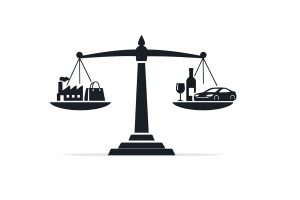AI and the World of Work Displacement, Transformation, and the Gig Economy As Artificial Intelligence (AI) continues to reshape the employment landscape, it brings about several profound changes and challenges. This article explores the multifaceted impact of AI on jobs and careers, from automation-induced displacement in certain sectors to the transformation of job roles in others. Additionally, it delves into the emergence of the gig economy driven by AI platforms and the ethical and social concerns surrounding AI’s influence on decision-making.
Automation and Job Displacement: AI is causing a significant displacement of jobs in industries that rely heavily on routine and repetitive tasks, such as manufacturing and customer service. As AI systems become increasingly capable, many traditional job roles are becoming redundant, raising questions about workforce retraining and job security.
Transformation of Roles: In fields like healthcare and finance, AI is not just displacing jobs but also transforming them. Workers in these sectors need to adapt, upskill, and learn how to collaborate effectively with AI systems to remain competitive and relevant in their professions.
Rise of the Gig Economy: AI-driven platforms have given rise to the gig economy, offering individuals flexibility and opportunities to earn income on their terms. However, this transformation often comes at the expense of job security and traditional employment benefits, which poses challenges for workers seeking stability.
Ethical and Social Concerns: AI’s role in decision-making can perpetuate biases, whether in hiring, lending, or other critical areas. This raises ethical and social concerns, highlighting the need for fairness and transparency in AI applications. It also underscores the importance of addressing bias and discrimination in AI systems.
The evolving relationship between AI and the world of work is a complex and multifaceted one. While AI presents opportunities for efficiency and innovation, it also brings challenges and uncertainties for the workforce. To navigate this changing landscape successfully, individuals, businesses, and policymakers must actively engage with these issues and work together to find solutions that benefit society as a whole.
Last Updated on: Monday, October 30, 2023 6:45 am by Anu Priya | Published by: Anu Priya on Monday, October 30, 2023 6:45 am | News Categories: News, Business, Economy, GENERAL, Startups, Tech


